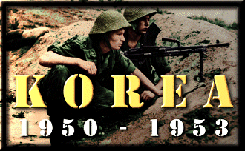The Battle of the Imjin River
In April of 1951, the Chinese 1st Chinese Communist Field Army was commanded by General The-huai Peng. Peng was deeply worried by his shortage of trained, experienced troops. He was forced by circumstance and this lack to resort to the cruel expedient of using his untrained formations to absorb the weight of the Un fire and swamp their defences, and then follow-through with his best units. Imjin River was one such battle, and one of the hardest fought.
Conversely the United Nations troops were less in number, but most were dedicated superbly trained, well led and well equipped including some world war two veteran reservists. In the sky, with the F-86 Sabres keeping the MiG 15s at bay, the UN pilots were astoundingly effective against the Chinese ground forces and most of the pilots were world war two veterans against the almost completely inexperienced Chinese and a few Russian pilots.

Peng chose the I Cops to throw his principal thrust against, which would be made by the 63rd Army, composed of the 187th, 188th and 189th Divisions, each about 9000 strong and containing a high percentage of the most experienced and battle-hardened troops available. The plan involved a rapid march to the Imjin River commencing on 21st April, the breaking of the Allied front, and an immediate advance on Seoul down the traditional invasion route, the effect being to isolate a major part of I Corps, which would be trapped with its back to the sea. Peng stressed that speed was essential and he expected his leading elements to reach Seoul within 36 hours of crossing their start-lines. These plans fell against the British 29th brigade, which lay directly across the path of the 63rd Army.
The 29th brigade consisted of the 1st Battalions each of the Royal Northumberland Fusiliers, the Gloucestershire Regiment and the Royal Ulster Rifles, plus a small belgian battalion under the command of Brigadier Tom Brodie. They were supported by 25-pounder guns of 45 Field Regiment, Royal Artillery and the 4.2 inch mortars of 170 Mortar Battery, Royal Artillery. One troops of the latter being attached to each of the brigade's battalions and some kilometers to the rear, were the Centurion tanks of the 8th King's Royal Irish Hussars. The Brigade was responsible for a 15 kilometer (9-mile) section of the front.

The Glosters held Castle Hill (point 148), point 182 and point 144 all of which had some significant distance between them and beyond that a 3-km gap separating the Glosters from the Fusiliers. On the Glosters section of the front, including reserves and Royal Artillery men, there were 773 men. The Glosters were led by Lieutenant Colonel James Carne DSO who had fought in the earlier campaigns of the korean War. First contact with the enemy came at 2200 hours on 21st April, when a three-man listening post down at the ford in the river (Gloster Crossing) detected a 14-strong Chinese patrol. The Glosters killed three of the patrol outright and four more were dragged back to the far bank by their comrades. By 2230 hours, the Chinese were swarming across Gloster Crossing in the face of sustained fire from the listening post and heavy artillery and mortar fire which decimated the packed Chinese ranks on the far bank. As the Chinese swarmed Castle Hill they were met by the sustained and accurate fire form A Company.
At first-light a Gloster counterattack was taken by surprise by the chinese and mauled severely as it was forming up. Here Lieutenant Philip Curtis was awarded a posthumous Victoria Cross as he threw a grenade into the captured Castle (a concrete observation post) of Castle Hill and destroyed the enemy machine gun crew inside. A Company withdrew to Point 235 which became Gloster Hill as the Royal Artillery blanketed Castle Hill with high explosive. D Company fought a similiarly vicious battle and at first light fell back to Gloster Hill.
B Company fought off several attacks with severe loss to the enemy, and withdrew when the Chinese 188th Division moved into position between it and the fusiliers threatening to cut it off, the Company withdrew to Point 314. Chinese infiltration parties were here, but were quickly disposed of by 1030 hours.
The Morning of 23rd April saw the arrival of the Glosters' F Echelon which arrived with food and ammunition and some 40 of the battalion's wounded were evacuated, but at noon the Chinese cut the route to the rear and secured the road. The Glosters were cut off, Carne decided against a breakout and determined that the Glosters would not give the Chinese the track over which they stood guard. During the afternoon brigadier Brodie informed Carne that a attempt to reinforce the battalion would be made the following day.
By now, Peng's plans were already 24 hours behind schedule and the 187th Division was a wreck of its former self. The commander of the 63rd Army decided to throw both the 188th and 189th Division in a night assault to wipe out the Glosters. The attack began at 2230 hours and was directed against B and C companies. The Chinese were apparently unaware of B Company position and obligingly advanced on it front and into its guns. they were cut down in droves as they advanced. Attempts to go around only led the Chinese into designated killing zones of the Glosters' defensive fire plan. Soon, they discovered the gap between B and C companies and began to penetrate this in large numbers. C Companys' 8 and 9 Platoons were swamped by a rolling attack down the slope. Company HQ and 7 Platoon fought off a further attack at 0400 hours, but situation deteriorated and placed Battalion HQ and the mortar position in the direst jeopardy, and Carne moved these onto Gloster Hill, where they were joined by the remnants of C Company.



